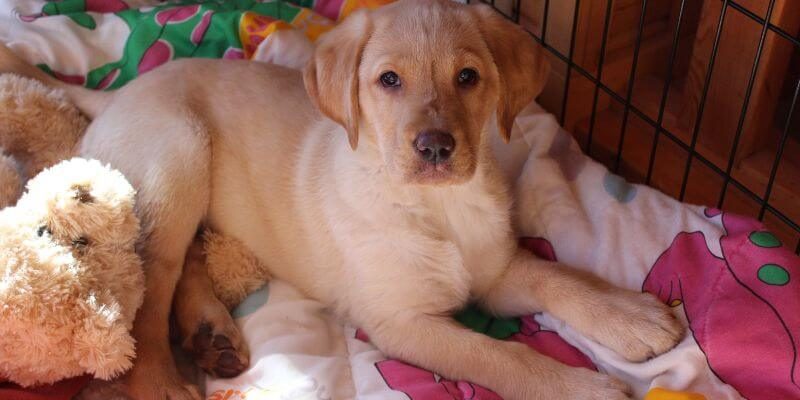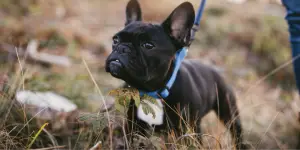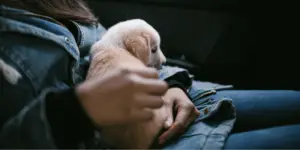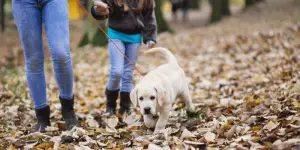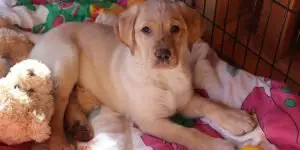
9-Week-Old Puppy Development – what to expect
At 9 weeks old, your puppy should either have had a week to settle in with you or is about to come home for the first time. Hopefully, your house is fully prepared for the addition of a new pup and you have everything you need to give your pooch the best care possible.
Puppy parenting can be an exciting but equally nerve-racking time, especially if you’re a new dog owner. But don’t worry, our handy guide will help you know exactly what to expect during the 9-week-old puppy development stage so you and your four-legged companion can rest a little easier.
9-week-old puppy sleep schedules
Puppies need a lot of sleep as they are rapidly developing and constantly learning new experiences. It’s not uncommon for puppies at 9 weeks old to be full of beans one minute, then fast asleep the next. All that playing and growing is hard work!
Dogs tend to sleep in small, frequent amounts throughout the day as they are polyphasic sleepers. Most canines sleep for around 45 minutes at a time and normally only spend around 6 minutes in the REM (Rapid Eye Movement) stage).
If you’re interested in learning more about puppy sleep cycles and dreams, we have a separate guide dedicated to the topic.
How much sleep does a 9-week-old puppy need?
Dogs sleep considerably more than humans, especially puppies. At 9 weeks old, your puppy is quickly growing and learning about the world around them, which takes up a lot of energy resources.
As a result, puppies need plenty of shut-eye to replenish their energy levels and continue developing, so it’s not unusual for them to snooze for between 18 to 20 hours a day. As your puppy grows, they won’t need as much sleep, with 6-month-old pups only requiring around 16 hours of sleep a day.

The Vet's top tip - 9 week old puppies
"By 9 weeks you should have had your pup seen by the vet for their initial health check. This would have included their primary puppy vaccine and flea and wormer if due. Do also check that they have been microchipped and that the chip is now registered to you. "
- Dr Linda Simon MVB MRCVS

9-week-old puppy training
Although 9 weeks old is still a little young for dogs to fully grasp potty training and advanced commands, you can start the basics. Simple commands like “sit and “wait” are a couple of actions you can begin teaching your pooch, as well as crate training.
The latter is particularly useful for housebreaking puppies as dogs are much less likely to soil where they sleep. In addition, a crate provides your puppy with a safe and comfortable space they can access when they feel anxious or scared.
It’s important for your puppy to have a positive perspective of their crate – the area should be warm, cozy, and quiet. It should never be used as punishment if your puppy misbehaves as this can cause a negative association.
Fill the crate with a dog bed, toys, and a few treats to make it as inviting as possible. If your pup investigates the crate, shower them with praise.
Start closing the door while your puppy is inside the crate for a few seconds while you’re still in the room, then gradually increase the duration until your pooch is calmly sitting inside their crate for several minutes.
Once your dog is comfortable being in the crate with the door locked for a few minutes at a time, you can begin leaving the room. Eventually, your puppy will be happy being inside the crate without your presence.
If your puppy is crying in the crate, make sure they don’t need a potty break, water, or food. If they continue to cry, don’t give them any attention until they’ve calmed down.
Only return when your puppy is quiet. You need to teach your pooch that being noisy is ineffective and will not result in attention.
9-week-old puppy behavior
A 9-week-old puppy is akin to a human toddler – they’re playful, lively, and a little on the mischievous side. In addition, around this age, it’s not uncommon for pups to go through a fearful phase where they are afraid of everything.
Your pooch might suddenly act scared around objects and activities that they were previously comfortable with.
These fear periods normally last a few weeks and then disappear. A second fear period also tends to occur around 6 to 14 months of age.
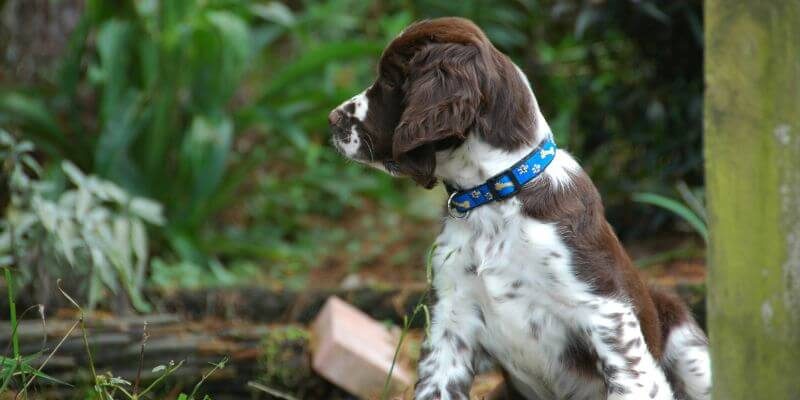
9-week-old puppy feeding
Puppies at 9 weeks old should be fed 3 to 4 times a day until they are 12 weeks of age. Spread out your pup’s meals throughout the day (in other words, don’t feed them 3 or 4 meals at once!).
Make sure you feed your young companion high-quality dry or wet food that’s targeted specifically for puppies. Adult dogs have different nutritional requirements than young canines, so feeding your puppy food meant for an older life stage for an extended period of time can lead to malnourishment and nutrient deficiencies.
How much does a 9-week-old puppy eat?
The amount of food you should feed your puppy depends on their size and the brand you feed them. Small breeds will need a lot less food than large breeds, as you probably already know.
Most commercial dog food brands will list recommended feeding guidelines on the back of the packaging so you know how much food to feed your puppy. Alternatively, you can speak to your vet for advice.
Keep an eye on your puppy’s weight to make sure they aren’t losing or gaining too much body mass. This will also help you figure out whether you are feeding your pup too little or too much food.
How much water does a 9-week-old puppy need to drink?
Similar to food portions, the amount of water a 9-week-old puppy needs to drink depends on their size and energy levels. Additionally, if your puppy is fed dry food, they’ll need more water as it contains less moisture than wet food.
As a general rule of thumb, around 20 to 40 ml of water per pound of body weight is sufficient for young pups. So, for instance, if your pooch weighs 5 lbs, then they’ll need around 100ml to 200ml of water a day.
Make sure your companion has access to fresh, clean water during the day, especially in hot weather. Even if you’re currently housebreaking your puppy and want to reduce the risk of overnight accidents you should not limit their water intake before bed.
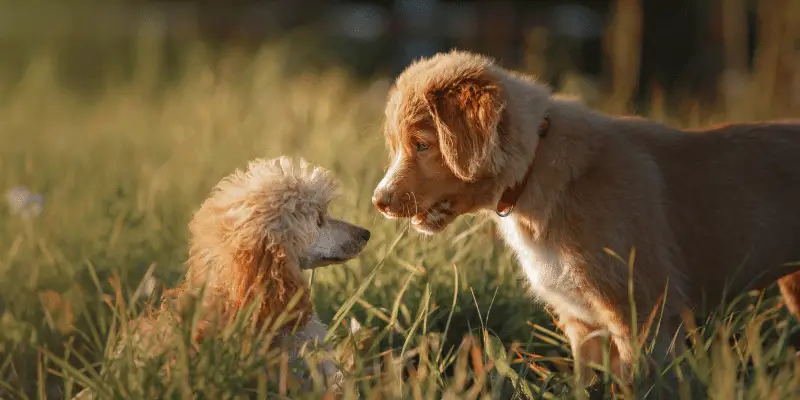
9-week-old puppy socialization
It’s important to socialize your puppy as soon as possible so they grow up to be a confident, well-mannered dog, both around people and other canines. Introduce family and friends to your puppy so your new companion can learn how to behave around humans, making sure to discipline or reward them when they are behaving correctly.
Once your puppy has their first and second vaccinations, allow them to meet other dogs in public areas. Puppy kindergarten is also a great way for your dog to meet other puppies and make some friends.
Can my 9-week-old puppy meet other dogs?
As long as your puppy has been fully vaccinated, then they can meet other (vaccinated dogs) in public areas. However, you’ll need to wait at least 2 weeks after your puppy has had their second vaccination before you let them interact with other dogs.
9-week-old puppy appearance
A 9-week-old puppy looks like a miniature version of their adult counterpart. They have silky soft fur that doesn’t shed very much and have 28 milk teeth in their mouth. It isn’t until around 12 weeks old that puppies begin losing their deciduous teeth.
Depending on the breed of your puppy, it might be some time until they develop their adult coloration and markings. For example, Yorkshire terriers are black and tan as puppies but silvery-blue and golden as adults.
9-week-old-puppy health and care
Alongside feeding, socialization, and training, there are other components to your puppy’s care, including exercise, grooming, and mental stimulation. Once your puppy has finished both rounds of vaccinations, you’ll be able to take on daily walks in public areas.
While you won’t be able to go on long treks with your pup just yet, you can give them a 10- to 15-minute walk around the block to let them expend some energy. Don’t over-exercise your pup as this can put unnecessary strain on their joints and legs, which can lead to injury.
At 9 weeks old, you can start getting your puppy used to grooming. This includes clipping their nails, brushing their coat, and cleaning their ears and teeth. Your puppy may require daily or weekly brushing depending on the length of their coat.
Aim to clip your puppy’s nails every 3 to 4 weeks and clean their teeth a few times a week. Weekly ear cleaning is normally sufficient for most breeds.
Can I walk my 9-week-old puppy outside?
You can let your 9-week-old puppy outside in an enclosed backyard as soon as you bring them home. Make sure the area is secured with a sturdy fence and has no small gaps that your pooch could slip through.
You should also make sure it is free from thorny plants that your puppy could injure themselves on. Poisonous plants like azalea, deadly nightshade, hemlock, iris, English ivy, and mistletoe should also be removed from your backyard.
Public parks and spaces should be off-limits to your puppy until at least 14 days have passed after their second vaccination. Dogs can be vaccinated as young as 4 weeks old, but most owners vaccinate their puppies at 8 weeks old, then again at 10 weeks old.
Your puppy will need a booster vaccination at 6 months or 12 months old and then every year to remain protected from infectious illnesses.
9-week-old puppy schedule
Dogs enjoy routine as it allows them to understand what to expect each day, such as when meal times and walks occur. Below is an example schedule you could use for your 9-week-old puppy to help you plan out their day.
7am – Bathroom break
8am – Breakfast and activity
9am – Bathroom break and nap
10am – Activity
11am – Bathroom break and nap
12pm – Activity
1pm – Lunch, bathroom break, and activity
2pm – Activity
3pm – Bathroom break and nap
6pm – Bathroom break, dinner, and activity
7pm – Nap
8pm – Activity
10pm – Bathroom break and bed
2am – Bathroom break
Final thoughts
Puppies at 9 weeks old can be hard work, but once you get into the swing of things and keep in mind the above factors, you’ll be a pro puppy parent in no time. Remember to crate train your pooch as soon as possible to make the housebreaking process a lot simpler.
Make sure you also book an appointment with your vet to get your pooch vaccinated. This will open up the number of activities your puppy can do, as well as make socialization much easier.
Lastly, enjoy your new puppy and all the joy and (occasional mischief!) they bring to your life!
References
- https://www.pdsa.org.uk/what-we-do/blog/vet-qa-new-puppy-questions
- https://www.dogstrust.org.uk/help-advice/factsheets-downloads/factsheetpoisonoussubstances09.pdf
- https://wagwalking.com/lifestyle/dog-ownership/puppyhood-what-to-expect-at-9-to-10-weeks#:~:text=Introduction,will%20be%20watching%20them%20closely.
- https://ourfamilydog.org.uk/your-new-dog/puppy-stages/your-9-week-old-puppy

